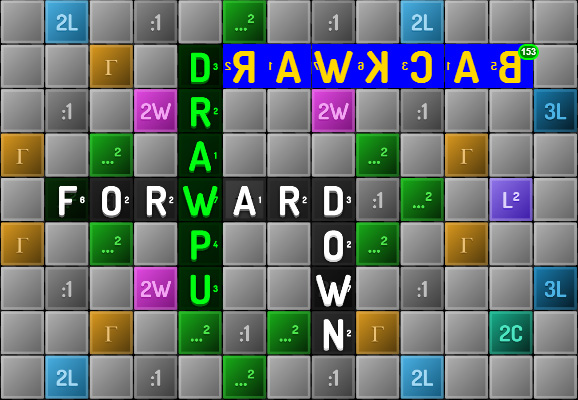
Full Rules
- Per turn, letters may be placed upon the start tile or orthogonallyadjacent to existing letters to form primarily valid Oxford Dictionary new words reading in either direction.
- Any bonus tile covered in a turn is applied to any words its letter makes that turn. It is then consumed and may not be used in following turns.
- As such,anadromesandpalindromesare worth around double, since two words are placed in two directions in one turn.
- Thankfully the game automatically calculates and displays points, but should that be too vague, bonuses are applied per word and direction in the below order. It should also be noted that most boards will only contain a few types of these tiles, detailed in the in-game rules, so memorization of all tiles is not necessary.
- First, letters may be revalued:
- reviver - always makes all tiles in its word usable, consumed or not
- 0 - letter value is 0
- 1 - letter value is 1
- 2 - letter value is 2
- 3 - letter value is 3
- 4 - letter value is 4
- 5 - letter value is 5
- 6 - letter value is 6
- 7 - letter value is 7
- 8 - letter value is 8
- 9 - letter value is 9
- 10 - letter value is 10
- 50 - letter value is 50
- 100 - letter value is 100
- inverter - inverts letter value by subtracting it from 10
- alpha - letter value is its place in alphabet (A=1, B=2, ...Z=26)
- ceiling - use highest valued letter for all in word (canceled by floor)
- floor - all letters worth 1 (canceled by ceiling)
- Then category bonuses are applied to applicable letters:
- triple vowels - triples all vowel values in word (+Y)
- double consonants - doubles all consonant values in word (not Y)
- double v-symmetry - doubles all letters with vertical symmetry in word (AHIMOTUVWXYQ)
- triple h-symmetry - triples all letters with horizontal symmetry in word (BCDEHIKOX)
- quadruple r-symmetry - quadruple all letters with 180° rotational symmetry in word (HINOSXZ)
- Then single-letter bonuses are applied:
- regular - No bonus
- double letter - doubles letter value
- triple letter - triples letter value
- quadruple letter - quadruples letter value
- letter squared - squares letter value
- factorial - multiply letter value by all integers below it to 1
- plus - add the next letter's value to this one (if last; 1st)
- times - multiply this letter's value by the next (if last; 1st)
- power - exponentiate this letter's value by the next (if last; 1st)
- mimic - letter value is equal to next letter's value (if last; 1st)
- sum - letter value is sum of all letter values in word
- Then letter values are combined into a word score:
- product - multiply (instead of add) values together to get word score (stacks!)
- Then word bonuses are applied:
- double word - doubles word value
- triple word - triples word value
- quadruple word - quadruples word value
- length squared - add word length squared
- If a user places a full rack of letters in one turn, the rack length × 5 is added to the turn score.
- Between one and all of one's letters may be swapped instead of placing a word on the board that turn.
- A game ends when:
- A player resigns, either actively or passively after 20 days of no activity, losing outright without comparing scores.
- A continuous string of passes occur such that the same person passes twice.
- There is both one empty rack and an empty letter bag.
- One player's score exceeds 1.7976931348623157e+308, or about (550 googol)3, becoming an Infinity, at which point comparisons are not meaningful.
Any remaining rack letter values are subtracted from their owners' scores, and the highest score wins. The victor's tile inventory increases by the number of tiles consumed that game.


